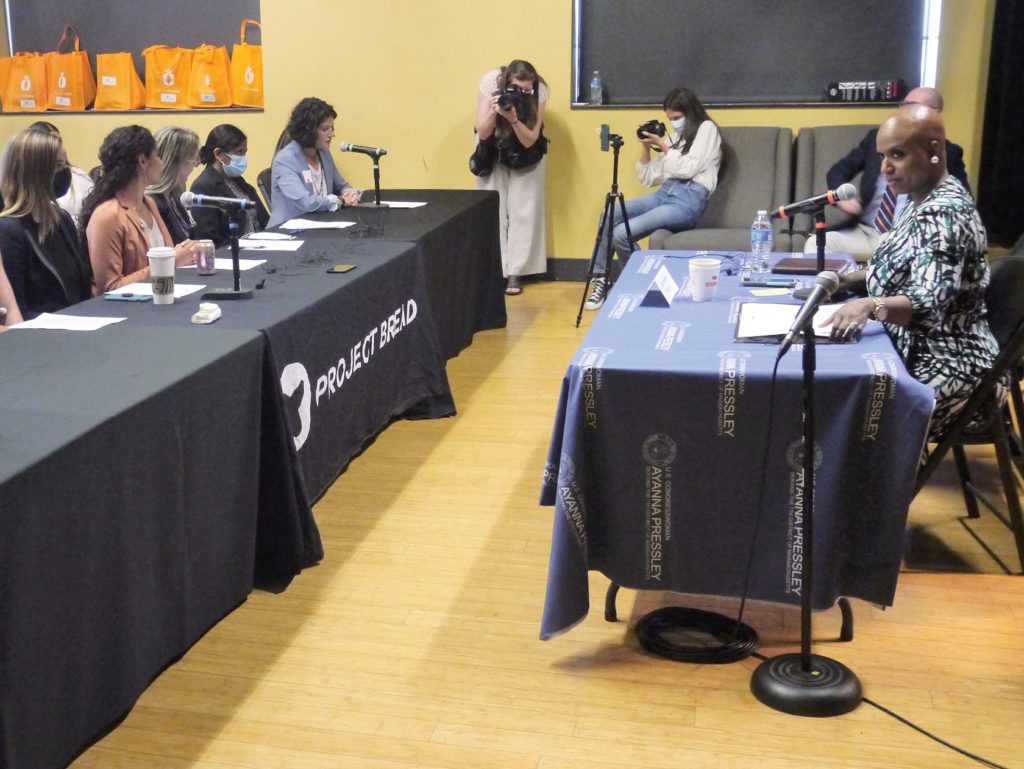Pressley hosts meeting on hunger
Advocates testify on persistent food insecurity

At some point in August 2020 while the COVID-19 pandemic was raging, Denise Lauers exhausted her savings and began looking for help feeding herself and her two sons.
A longtime Somerville resident and single mother, Lauers said she lost about 80 percent of the income she earned from her small cleaning business after business dried up in the pandemic. Even though her children were receiving child support payments along with $80 a month in federal food assistance, she continued to struggle.
“How much can you survive on $80 a month?” she said, pointing to her own lack of eligibility for federal assistance because of her immigration status and income.

U.S. Rep. Ayanna Pressley COURTESY PHOTO
Lauers was one of about 25 parents and food security advocates who offered testimony and recommendations at a public conversation on food insecurity led by U.S. Rep. Ayanna Pressley in East Boston Monday. Making school meals free and integrating food insecurity screenings into public healthcare systems emerged as popular solutions.
The conversation comes as President Joe Biden’s administration prepares to convene a conference on hunger, nutrition and health in September. It will mark the first conversation of its kind since 1969, when then-President Richard M. Nixon held a similar event that yielded hundreds of policy recommendations for reducing hunger.
“To be honest, it’s by the mercy of God that my kids never went to bed hungry,” Lauers said tearfully, pointing to high grocery prices. “We do have a little bit more of [federal] benefits, but it’s still not enough.”
Advocates testified, too contending that universally free school meals would ensure even children from struggling families can eat.
“We want nationwide, or at least here in Massachusetts, to make sure all kids can rely on having free school meals,” said Erin McAleer, CEO of the East Boston-based anti-hunger nonprofit Project Bread. “We know universalism breaks down stigma, reduces costs and feeds kids.”
McAleer says one in five families with children in Massachusetts struggle to afford enough to eat. Prior to the pandemic, it was roughly half that — at 9 percent.
The share of food-insecure families peaked in 2020, then started to dwindle as pandemic food assistance and other programs ramped up. But many programs were scaled back, McAleer said, driving a resurgence in food insecurity, particularly among people of color.
“When you also break those numbers down by race and ethnicity, what we’re seeing is over 33 percent of Black and Latino and multi-racial households in Massachusetts are experiencing food insecurity. … So, we’re very much still in a crisis here.”
Officials with Project Bread and other organizations also proposed adding food insecurity screenings to patient intake procedures at healthcare facilities.
Greg Wilmot, president of East Boston Neighborhood Health Center, said in 2020, his staff began asking patients about food insecurity and offering things like grocery story gift cards, purchasing assistance for refrigerators and cooking utensils and aid with federal food assistance applications to those in need.
“Community informed, family-centered, person-centered solutions is what this issue is going to require,” he said.
Lauers said she believes federal food assistance programs, like the Supplemental Nutrition Assistance Program formerly known as food stamps, should also be a universal rather than income-based.
“Because, if you go to apply for [SNAP], it’s not fun,” she said.
Many of the people who shared personal stories of struggling indicated they were living in the country illegally, which Pressley said needs to be addressed directly.
“When we talk about universal access, it means denying no one,” she said to reporters. “No one should be left behind, no one should go hungry in the richest nation in our country.”
Asked about her congressional colleagues’ appetite for solving hunger, particularly among those intertwined with the issues of immigration and undocumented status, Pressley said she would continue to treat the issue with urgency.
“Unfortunately — and it doesn’t make me feel good to say this because I do serve in government — more often than not, government does not lead, it responds,” she said. “I don’t make predictions about folks, I just have to keep centering the lived experiences of those that I represent and fighting for their most basic needs to be met.”
Saraya Wintersmith covers Boston City Hall for GBH News.






